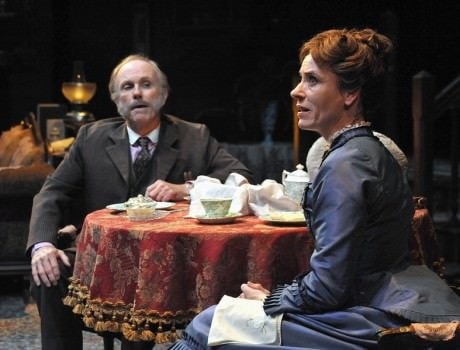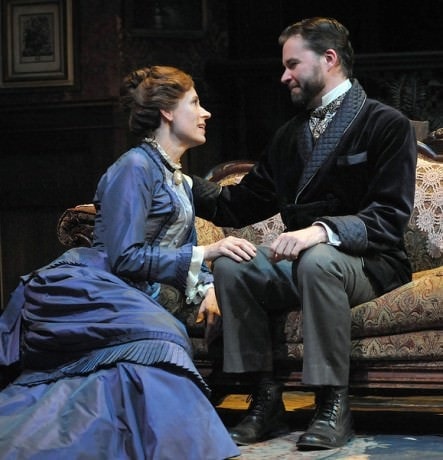A delightfully twisted suspenseful drama lights up the stage at Olney Theatre Center this summer as they present the classic Victorian thriller Angel Street. Directed by John Going, this sharply focused play is a fitting production for continuing in the theatre’s 75th Anniversary season as the play was written in the same year that Olney Theatre Center was opened.

A classic by any standards this well-paced intense drama hones in on a seemingly average couple in Victorian London, Jack Manningham and his lovely young wife Bella. Only all is not as it seems. It appears poor Bella would follow in the footsteps of her mother going stark raving mad leaving Jack to send her away. Is she truly going mad or is Jack’s rigid kindness intentionally driving her out of her head? Only the extraordinarily dedicated, and aptly named, Detective Rough of Scotland Yard can set the case to rights before it’s too late. A brilliantly crafted production each moment escalating the suspense straight to the climactic conclusion, this performance will set a gaslight a flame beneath the audience, keeping them on the edge of their seats till the end.
Scenic Designer James Wolk leaves the audience marveling at the sheer stunning beauty of his highly intricate and complex set. The interior of the Manningham home is the epitome of classic Victorian style; posh and polished without appearing too expensive. Rich hues of mahogany wood accent the deep mauve and faded magenta color scheme of the room. Elegant velvet drapes cover the window and there is even the subtle hint of gold in-lay, patterned in fleur-de-lis, against the dusky rose wallpaper. Wolk’s extravagance knows no bounds as the set extends upward into a fully functional second and third story; an astonishing and breathtakingly beautiful piece of work if ever one has graced the main stage. His attention to detail is faultless, even the dust ring around the missing portrait is noticeable. Wolk’s work is worthy of its own review for all the effort and astonishing detail that went into it.
Lighting Designer Dennis Parichy augments the perfection found in Wolk’s set work with flawless execution of the gas-lamp lighting in scene. The dimming and raising of the lights, which happens frequently throughout the show, never misses a beat, dulling and brightening the room accordingly in true gaslight fashion. Parichy plays with darkness as well, letting the shadows illuminate and mask what needs to be hidden and seen in the upper levels of the set.
Rounding off the perfect fit of the era is the work of Costume Designer Liz Covey. If the set and lighting weren’t enough to solidify the presence in Victorian London, the clothes cement the deal. Covey chooses a muted blue for Mrs. Manningham’s complex layered dress, a reflection of her internal struggle as well as her external melancholy. The dapper cleanly pressed suit is the mark of a polished gentleman for the man of the house and the servants’ clothes are appropriately downtrodden, though Nancy’s evening outfit is flared with hints of burnt orange and earth tones, making her look just as saucy as her character ought to be. Covey is true to the style of the times with the high collars, full length sleeves and subtle bustles in the dress. It’s a feat well worth noticing as it completes the total Victorian look of the production.
Director John Going, working in conjunction with Dialect Coach Nancy Krebs, achieves the perfect social class delineation between the servants and those they serve. Krebs sets Elizabeth (Laura Giannarelli) the older of the two maids in service with a much more respectable version of her cockney accent, making her sound as if she’s trying to speak proper English on account of having been serving the upper class for so long. But she makes a clear distinction between proper English in cockney and polished English with a softer sound used by the Manninghams and Detective Rough. These differences authenticate the production all the more and draw the focus into the character’s individual choices.
Going has a way with pacing. This thriller requires serious emotional builds in order to successfully achieve the intense suspense and tension of the author’s work, and Going places pauses at just the right moments for a triumphant execution. Each scene that passes escalates the palpable, albeit silent, tension that is straining between the married couple until finally it erupts in a raw and exposed fashion that drives home the conclusion of the play. Going crafts extreme heat into the moments of contention, particularly when Jack is pursuing Bella, utilizing clever blocking and spatial relationships to achieve this effect.
Even in a rich and suspenseful thriller there ought to be moments, however brief, of comic relief. And in this production they are carried by Nancy (Dylan Silver). With a thick cockney accent and a rather simplistic manner about her speech patterns, Silver delivers quick quips to give the audience a momentary chuckle. It’s her sassy attitude, echoed in the way she struts about, especially in Act II, that really catches the eye, and despite her intellectual density she knows how to work herself over to Mr. Manningham. Silver carries herself with an air of privilege well above her character’s station which serves to agitate the lady of the house a good deal.
When first appearing on the scene, Detective Rough (Alan Wade) is as his name suggests, a bit coarse and perhaps even a little off-kilter. Rough is a quirky character whose purpose is made expressively clear as they play progresses, but before that point he seems just as barking bonkers as the lady of the house. Wade approaches the character with a brisk enthusiasm, his constant motion about the parlor making him appear restless, like a man chomping at the bit to get back into action. He embodies peculiar yet fitting affectations, taking to leaning fully over the coach when driving the point of his conversation home making him look a bit like an angled plank. Wade fits the bill for the stereotypical investigator of the times. Jack Manningham (Jeffries Thaiss) is indeed the versatile character, a bit like an onion; wrapped up in many layers, making women cry. Thaiss does an impeccable job of embodying the somewhat unctuous man, balancing his ‘kindness’ and ‘affections’ for his wife against his firm handling of her. Acting as more the antagonist and catalyst than anything else, Thaiss has a manner about his stage presence that immediately leads the audience to distrust him, or at the very least become suspicious of him. At first the tension between he and his wife holds a subtle existence, bubbling quietly beneath the surface in the subtext. But it only takes a moment before that wound is scored open and aired out into the open. Thaiss grapples with a intense violence in his voice when on the defensive against his wife and becomes a madman possessed by anger laced with fear, which he seamlessly transfers into the terrified woman.
Bella Manningham (Julie-Ann Elliott) is on a downward spiral into madness from the very top of the show. Elliott physically manifests the distinguishing features of her character’s nerves in her constant pacing and hand-wringing, her face looking forever worried with lines creased into her expressions. She’s terribly apprehensive and perpetually nervous, both traits radiating through her quavering voice and out into the very stiff posture of her body. Wearing a tragic disposition, Elliott reflects all of her jumbled emotions outwardly really letting the audience experience all of the pains and sorrows she’s feeling. When she finds her character heading for a meltdown or moment of tears she draws up into the hysterics quite quickly, her harsh voice shrilly shrieking as her pacing redoubles its speed. Elliott plays these moments of hysteria at their highest peak; so severely erupting from a dark wounded place deep within her character’s psyche that it’s nearly maddening to watch her go mad. Such a perfect physical and vocal embodiment of her character’s plight makes Elliott firmly connected to the woman she’s playing on stage; a magnificent performance that truly drives home the dramatic conclusion of this production.

Get your tickets before the jig is up! Don’t let the gaslight burn out on you this summer and go see Angel Street at Olney Theatre Center.
Running Time: Two hours and 10 minutes, with one intermission.
Angel Street plays through July 14, 2013 on the Main Stage at Olney Theatre Center — 2001 Olney-Sandy Spring Road, in Olney, MD. For tickets, call (301) 924-3400, or purchase them online.




